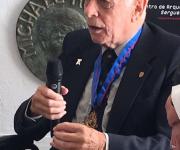Obituary: Michael Hoskin, Emeritus Fellow of St Edmund’s College
2021-12-10
Image: Michael Hoskin giving his acceptance speech at Antequera, Spain. (Jon Hoskin)
Michael Hoskin, who was an Emeritus Fellow of St Edmund’s College and its last surviving Foundation Fellow, died peacefully at his home in Cambridge on 5 December 2021. He was born in London on 27 February 1930, the only child of a tax collector and a schoolteacher. He attended a Catholic grammar school in West London, and recalled surviving the bombing blitz of 1940, then the V1 flying bombs and V2 rockets. At the University of London, he earned a BA and an MA in pure mathematics. He commenced his doctorate in algebraic geometry at Peterhouse in 1952. This led to a Research Fellowship at Jesus College in 1956. In the same year he married Jean (Jane) Margaret Small, with whom he had five children
By 1958, he had become unnerved by the sheer brilliance of other mathematicians at Cambridge. He sought a different field of scholarship offering what he described as “fun” and he succeeded to an inaugural lectureship in the history of science at the University of Leicester. Two years later, when a similar lectureship at Cambridge became vacant, Hoskin was appointed without interview, and went on to enjoy a distinguished career here.
Initially, his teaching responsibilities covered the whole of the history of science. In addition, he was the doctoral supervisor of D. T. (Tom) Whiteside (1932–2008), with whom he would eventually co-edit The Mathematical Papers of Isaac Newton, a monumental enterprise encompassing eight volumes, published by Cambridge University Press. Michael felt that his work on Newton’s cosmology was his most important lifetime contribution. He also became the world’s leading scholar on the Herschel family of astronomers, writing eight books and numerous papers on their work. In 1969 he founded The Journal for the History of Astronomy, which he edited for the next 45 years.
Michael’s retirement gave him an opportunity to undertake two decades of fieldwork in France, Portugal, Spain, and the Balearic Islands on neolithic tombs, temples, and dolmens. This resulted in a corpus of measurements and orientations for some 3000 archaeological constructs. At Antequera in southern Spain, his research on temples and three enormous dolmens had a momentous consequence: he supported the local authorities in their successful application for World Heritage Status. For his decisive contribution he received the Gold Medal of the Kingdom of Spain from the hands of the King himself. In Antequera one can today admire the Mirador Michael Hoskin, together with a bust and plaque recording the gratitude of the City. The Archaeological Museum also bears his name.
In 1965, when St Edmund’s House became an Approved Society for graduates, Michael Hoskin was the first Fellow to be inducted. He often joked at formal dinners that “for five minutes I was the only Fellow of the College.” He served for four years as the first Vice-Master and the only Tutor. Later he became Secretary of the external board of Trustees of the Association. In that capacity he expertly managed the negotiations leading to the transfer of the ownership of the estate and endowment assets of the House to its Master and Fellows, which paved the way for St Edmund’s to become the full College of the University that it is today.
Hoskin left St Edmund’s in 1969 to join the Fellowship of Churchill College, where he oversaw the construction of the Archives Centre that houses the papers of Sir Winston Churchill and his contemporaries. Opened in 1973, it is one of the major British centres for historical research. Michael was President of the Senior Combination Room 1981–1991.
Throughout his association with St Edmund’s, Michael worked intensely on securing the Catholic heritage and traditions of the College. He described the Church’s transfer of all the assets to the Master and Fellows as an “act of enormous generosity.” Michael and his wife Jane, who died in 2013, were staunch supporters of the Chapel and its congregation.
Simon Mitton, Cambridge, 7 December 2021

